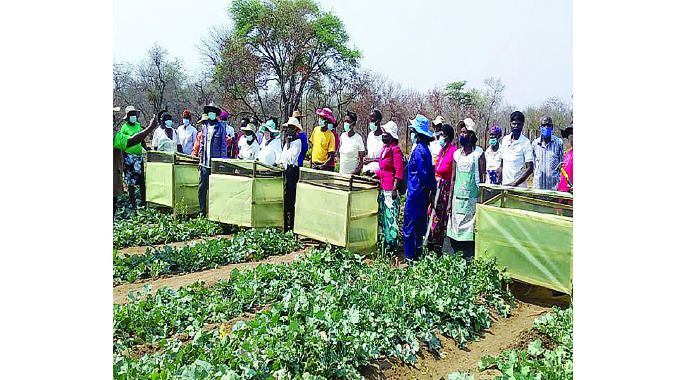Mini green belts sprout in Tsholotsho

Leonard Ncube, Victoria Falls Reporter
CLOSE to 4 000 villagers in three wards in Tsholotsho are benefiting from solar-powered nutritional gardens that were sponsored by the Community Technology Development Organisation (CTDO).
CTDO is a non-governmental organisation spearheading the multi-sectoral approach towards nutrition and adaptation (Mana) programme in Tsholotsho’s Sipepa Ward 5, Jimila Ward 6 and Sodaka Ward 1. The organisation is working with various Government departments and specifically with Agritex for the Mana project.
The programme seeks to empower communities, especially women and the girl child, by promoting indigenous food and crops, poultry and grafted fruit trees.
Three gardens in the three wards have been capacitated with solar powered borehole pumping system and have thriving varieties of vegetables, a development that has transformed the local communities into mini-green belts.
Some in Sipepa have benefited from the poultry “pass-it-on” project where beneficiaries get nine chickens each and pass them on to others after reproduction.
Families’ nutrition and income has improved.
The gardens have been in existence for years but operating in an unsustainable manner until CTDO came in with solar equipment.
Agritex chipped in with technical support.
Tsholotsho District Agritex officer Ms Rachel Sibanda said 3 600 villagers have benefited from the gardening project which targets about 6 000 beneficiaries from six wards but has been delayed in some wards because of water challenges.
Ms Kezia Mahliki, who is vice-chairperson of Silwalendlala Garden in Jimila’s Lucu line, said villagers now have sustainable supply of vegetables.
However, the borehole is overwhelmed as the water is also used for home consumption and for livestock.
Ms Siphiwe Ncube, who is chairperson of Togetherness Garden in Ward 5, said villagers now have a sustainable source of income.
Villagers have also been trained in making low-cost solar dryers to preserve traditional vegetables as one of the ways of improving food sufficiency and nutrition.–@ncubeleon











Comments